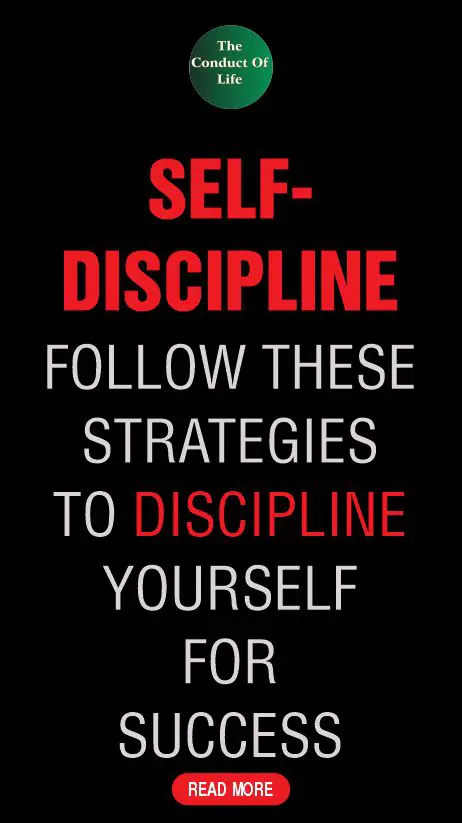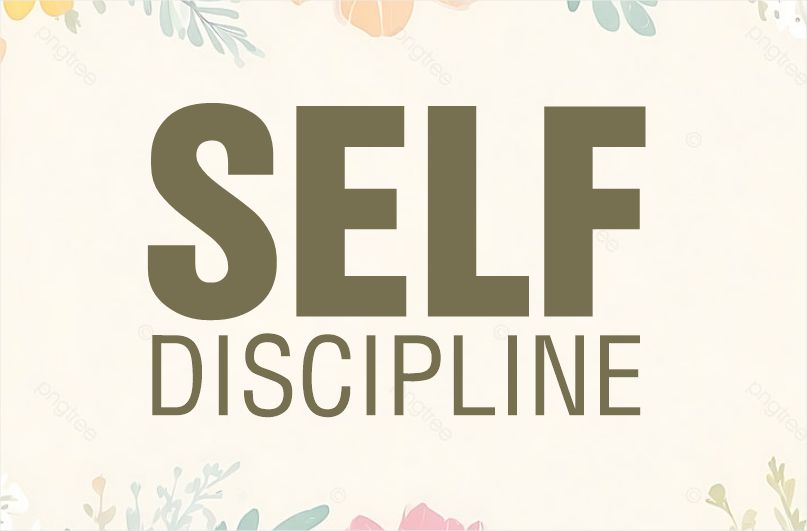Discover effective strategies for building self-discipline, mastering self-control, and achieving your goals. Learn how to develop focus, willpower, and consistency for lasting success.
Whether it’s a workout routine that fizzles out or a project left unfinished, we’ve all flopped on the path to self-improvement and personal growth.
But what if you could change that? What if achieving your goals wasn’t a matter of chance, but a result of your consistent choices and actions occasioned by self-control and regulation?
The key lies in mastering one powerful principle that can transform your approach to success.
It’s not about luck or talent, but creating the right daily habits and mindset to stay focused, committed, and determined to see your goals through to the end by applying self-restraint and putting distractions in their places.
You might want to pin the below image.

What Is Self-Discipline?
Self-discipline, also called personal discipline, is the ability to control your emotions, behavior, and actions, stay focused on long-term goals, and resist short-term temptations to achieve personal success.
It is a powerful tool that enables you to make decisions and take actions that align with your long-term goals, even when those choices feel uncomfortable or inconvenient.
Personal discipline is not about depriving yourself of enjoyment or imposing harsh restrictions.
Instead, it’s about making intentional decisions that support your bigger vision for the future.
By consistently choosing actions that move you closer to your aspirations, you develop the mental strength to stay focused on what truly matters, ensuring that your daily habits work harmoniously with the success you’re striving to achieve.
Related: 13 Ways to Achieve Mental Clarity
Characteristics of Self-Discipline
Personal discipline isn’t a single trait but a collection of habits and qualities that help you stick to your goals, even when it’s hard.
Let’s break it down:
1. Consistency
Think about your daily habits. Do you have a routine, or do you just go with the flow? Consistency is the backbone of self-discipline.
By sticking to a schedule, you give yourself structure and make progress without overthinking. It’s not about being rigid; it’s about creating a system that works.
This keeps procrastination at bay and helps you stay on track, no matter how chaotic life gets.
2. Focus
How often do you get distracted? Whether it’s social media or random interruptions, distractions can derail your plans.
People with self-discipline know how to tune out the noise. They set boundaries, like turning off notifications or working in a quiet space.
Staying focused isn’t always easy, but it’s a skill you can build with practice.
3. Delayed Gratification
Would you rather have a small reward now or a bigger one later? Delayed gratification is choosing the latter.
It’s about holding off on immediate pleasures to achieve something greater.
Whether it’s saving money, studying for a degree, or sticking to a fitness plan, this quality is a game-changer.
It teaches you patience and helps you think long-term.
4. Resilience
What do you do when things don’t go as planned? When you discipline yourself, it means you can bounce back instead of giving up.
Failures and setbacks are part of the journey, but they don’t have to define you.
With resilience, you see challenges as lessons, not roadblocks.
This mindset keeps you moving forward, even when the going gets tough.
5. Self-Restraint
Self-restraint is the ability to control impulses and actions, even when tempted.
It helps maintain focus on long-term objectives, preventing distractions, and supporting the consistent effort required for self-discipline.
These characteristics: consistency, focus, delayed gratification, and resilience work together to help you reach your goals.
Which one do you plan to begin with immediately? Take action!
Related: Meaningful lessons most people learn late
Benefits of Personal-Discipline
When you are disciplined, it affects nearly every part of your life. Let’s explore how it can make a difference in personal growth:
Personal Growth
Personal discipline pushes you out of your comfort zone and reverie.
It helps you to keep to time, follow rules, be patient, take on challenges, learn new skills, and pursue your goals consistently.
By doing this, you build resilience, which is necessary for handling setbacks and adapting to numerous life changes.
Every small victory adds up, shaping you into a more capable and confident person.
Increased Productivity
Do you struggle with getting things done? Self-discipline helps you set routines, prioritize tasks, and stay focused.
When you manage your time well and cut out distractions, you accomplish more in less time.
This not only boosts efficiency but also makes your goals feel more attainable.
Better Health
Self-discipline is key to maintaining healthy habits. Sticking to regular exercise, eating well, and getting enough sleep takes effort, but it pays off with more energy and less stress.
Over time, these habits improve both your physical and mental health, helping you feel and perform your best.
Stronger Relationships
Discipline also benefits how you interact with others. When you practice patience and communicate thoughtfully, you handle conflicts better and build trust.
Being consistent in your actions creates deeper connections and encourages respect. This makes your relationships more meaningful and lasting.
Challenges to Self-Discipline
Personal discipline isn’t always easy to maintain. Here are some common challenges you might face:
- Procrastination: How often do you put things off, thinking you’ll do them later? Procrastination is a major obstacle to disciplining yourself. The longer you delay tasks, the more overwhelming they become. This mindset can turn into a cycle of avoidance, making it harder to stay disciplined, especially when deadlines are looming.
- Distractions: Social media and entertainment are everywhere. It’s easy to get sidetracked by notifications or the temptation to binge-watch shows. These distractions eat up time, making it tough to focus on important tasks. The more we rely on these digital escapes, the harder it becomes to stay disciplined.
- Lack of Motivation: Do you ever struggle to find the energy to tackle your tasks? When life feels overwhelming, motivation can fade. Without a strong reason to push forward, it’s easy to lose momentum. Negative emotions like stress or frustration can also drain your drive, making it harder to stay on track.
How to Overcome These Challenges
To tackle procrastination, set clear, achievable goals to create accountability. Limit distractions by setting boundaries with social media.
Find your motivation and use stress-coping strategies to stay focused. By being aware of these challenges, you can develop a plan to overcome them and stay disciplined.
Strategies to Develop Self-Discipline
Developing self-discipline isn’t about sudden changes but rather a series of consistent efforts. According to CareerVillage, you have to train yourself to be self-disciplined.
Here are some strategies you can use:
Self-Control
Self-control is the ability to resist impulses and delay gratification. By practicing self-control, you can stay focused on long-term goals, avoid distractions, and build the consistency needed to develop personal discipline.
Set SMART Goals
Start by setting SMART goals: Specific, Measurable, Achievable, Relevant, and Time-bound. This gives you clear objectives to work toward, making it easier to stay on track and measure progress.
When your goals are well-defined, following through becomes more manageable, strengthening your self-discipline.
Build Positive Habits
Self-discipline grows through consistent, small actions. Dedicate a few minutes each day to a new habit, whether it’s exercise, reading, or learning something new. Over time, these small steps become second nature, reinforcing your discipline without overwhelming you.
Master Time Management
Time management is key to disciplining yourself. Use tools like schedules or to-do lists to prioritize tasks. By organizing your day and sticking to your plan, you minimize procrastination and stay committed to your responsibilities.
Overcome Distractions
Identify what distracts you most, be it social media, noise, or other interruptions. Once you know your triggers, create strategies to minimize or eliminate them.
This allows you to stay focused and reduces the temptation to veer off course.
Cultivate Self-Awareness
Self-awareness is important for personal discipline. Reflect on your thoughts, emotions, and behaviors regularly.
By recognizing patterns that derail you, you can make adjustments and stay aligned with your goals.
Seek Accountability
Tell someone you trust about your goals. Whether it’s a friend, mentor, or group, having someone to check in with makes you more accountable.
Accountability encourages consistency and helps you stay motivated when things get tough.
Related: Personal Growth Coaching
Self-Discipline in Specific Areas of Life
Personal discipline impacts many areas of your life, helping you achieve goals and success. Here’s how it shows up in key areas:
Work and Career
In your career, self-discipline is essential to staying focused and productive. By following a structured schedule and prioritizing tasks, you can improve your performance and meet deadlines.
When you stay disciplined at work, you become more dependable and professional, which can lead to career advancement and new opportunities.
Physical Health
Maintaining physical health requires self-discipline. Consistent exercise, choosing healthy foods, and sticking to a fitness plan take effort and perseverance.
Delaying short-term pleasures for long-term well-being strengthens your discipline. The more disciplined you are in these choices, the better your overall health will be.
Mental and Emotional Well-Being
It also plays a role in your mental and emotional health. Practicing mindfulness, meditation, or journaling regularly helps you manage stress and build emotional resilience.
When you remain disciplined in these habits, you can become more aware of your emotions and respond to challenges more effectively.
Financial Discipline
Financial discipline is crucial for achieving financial stability. Sticking to a budget, saving regularly, and making mindful spending decisions require consistent effort.
By setting savings goals and planning your finances, you ensure a more secure financial future for yourself.
Common Myths About Self-Discipline
Personal discipline is often misunderstood, and some myths can limit how you approach it. Let’s break down a few of the most common misconceptions:
Self-Discipline is Just Willpower
One myth is that self-discipline relies solely on willpower. While willpower plays a role, it’s not the only factor. Willpower is finite and can run out when faced with multiple challenges.
It involves more than just pushing yourself. It includes time management, goal setting, and emotional regulation. These are skills that help you pursue long-term goals without burning out.
You’re Either Born With It or Not
Another myth is that personal discipline is something you’re either born with or not. In reality, self-discipline is a skill you can develop over time.
It’s not an inherent trait. By setting small goals, creating structured environments, and practicing consistently, you can grow your self-discipline and make it stronger.
Self-Discipline Means Sacrificing Enjoyment
Many think that self-discipline is being strict and giving up pleasures. However, true self-discipline strikes that balance.
It’s choosing and making choices that align with your long-term goals while still enjoying life. It doesn’t mean deprivation; it’s making decisions that support your values.
Conclusion
Self-discipline is a powerful skill that influences every aspect of life, from personal growth to career success.
By mastering consistency, focus, delayed gratification, and resilience, you can unlock the potential to achieve your goals.
It’s important to remember that personal discipline is not being or deprivation; it’s about making choices that align with your values and long-term objectives.
While challenges like procrastination and distractions may arise, there are strategies and tools available to help you stay on track.
With dedication and practice, disciplining yourself becomes a catalyst for continuous improvement and lasting success.
Pious Clements is the insightful voice behind "The Conducts of Life" blog, where he writes about life ethics, self-development, life mastery, and the dynamics of people and society.
With a profound understanding of human behaviuor and societal dynamics, Pious offers thought-provoking perspectives on ethical living and personal growth.
Through engaging narratives and astute observations, he inspires readers to navigate life's complexities with wisdom and integrity, encouraging a deeper understanding of the human experience and our place within society.
